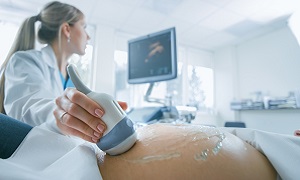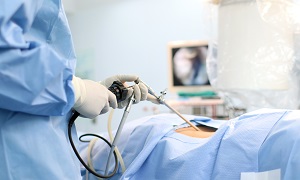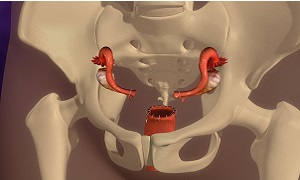What is Endometriosis?
Endometriosis is a disorder in the female reproductive system that is generally quite painful. A tissue called endometrium lines up the inner wall of the uterus in normal conditions. This tissue thickens, breaks down and bleeds with each menstrual cycle.
In endometriosis however, this endometrium grows ‘outside’ the uterus and commonly involves the ovaries, fallopian tubes and inner lining of the pelvis. Just like the normal endometrium tissues inside the uterus, endometriosis (tissues formed outside the uterus) also thickens, breaks and bleeds during menstrual cycle. However, it fails to exit the body and thus, causes irritation, scarring and adhesions.
Endometriosis can be quite painful, especially during menstrual period. Fortunately however, it is treatable.
Causes of Endometriosis
Following are some of the probable causes of Endometriosis:
- Abnormal menstruation- Medically is known as retrograde menstruation, in this case, menstrual blood flows back instead of releasing through the uterus. Menstrual blood contains endometrial cells, and if they flow back, it will be a problem because these cells may stick to the fallopian tube or the pelvic cavity (skin). Once they are stuck, they will thicken and break every time you go through menstruation.
- Immunity issues- The body becomes unable to segregate endometrial cells if the immune system is not working properly. As a result, it becomes difficult for the body to destroy and prevent the risk-bearing cells to multiply.
- Cell transformation- Estrogen is a very important hormone that is present in a female body. It works as a developer because of which the women’s pubic system and other female body parts develop. In some cases, estrogen somehow transforms into embryonic cells when a girl is growing up. These cells further transform into endometrial cells when the girl hits her puberty years.
- Previous surgeries- Surgeries such as a C-section may lead to endometrial cells getting attached to any surgical incision.
- Blood vessels- Blood vessels often become the carrier of endometrial cells from the uterus back to the fallopian tube and the pelvic skin.
Risk factors of Endometriosis
The following factors may place a person at a greater risk of developing endometriosis:
- Not giving birth
- Abnormalities in the reproductive tract
- Periods at an early age
- Any medical issue that leads to problems in regular menstruation
- Delay in menopause
- Family history of endometriosis
- Shorter menstrual cycles (a normal cycle is 27-45 days)
- Periods lasting more than a week
- Low BMI (body mass index)
- Excessive release of estrogen
Diagnosis of Endometriosis
Your doctor will ask you to elaborate on your symptoms to diagnose endometriosis and other conditions causing pain. This will also include the duration and the location of your pain.
Pelvic exam
Ultrasound
Your doctor will use high-frequency sound waves in this test for creating images of the inner side of your body. For the best view of the reproductive organs, he or she may perform both types of ultrasound. He or she will use a device called a transducer to insert in your vagina or press it against your abdomen for capturing the images.
MRI
Laparoscopy
Laparoscopy is a procedure in which your surgeon will view the inside of your abdomen. He or she will make a small incision to insert the laparoscope (viewing instrument) and look for the signs of endometrial tissue outside the uterine wall. It provides information about the size, location, and extent of the endometrial implants.
Treatment options for Endometriosis
Following are the common treatment options for Endometriosis:
Medications
Your doctor might recommend pain relievers like NSAIDs to alleviate the pain. He or she might also recommend hormone therapy in combination with non-steroidal anti-inflammatory drugs.
Hormone therapy
Supplemental hormones help to reduce or eliminate the pain of endometriosis. The endometrial implants get thick, break down or bleed due to the rise & fall of hormones. The endometrial tissue growth slows down due to hormone therapy and prevents new implants of the tissue. Hormone therapies that treat the condition are:
- Hormonal contraceptives
- Gonadotropin-releasing hormone antagonists and agonists
- Progestin therapy
- Aromatase inhibitors
Conservative Surgery
If you are trying to conceive while suffering through endometriosis, you can preserve the uterus and ovaries through a surgery that removes the endometriosis implants. You will benefit from the surgery if you have severe pain due to endometriosis.
Fertility treatment
You can face difficulty in conceiving due to endometriosis. Your doctor might recommend your fertility treatment for the same. The treatment involves stimulation of ovaries for making more eggs.
Hysterectomy with the removal of ovaries
Hysterectomy is the surgery to remove the uterus. The removal of ovaries results in menopause. There is a risk of heart disease. Hysterectomy treats the signs and symptoms of endometriosis. It reduces heavy menstrual bleeding as well as painful menses due to cramping of the uterine wall.
Complications of Endometriosis
Following are the two major probable risks of Endometriosis:
- Cancer– People suffering from endometriosis have a high occurrence rate for ovarian cancer. However, the overall risk is low. Although endometriosis increases the risk of cancer, it is relatively low. Some people may also suffer from endometriosis-associated adenocarcinoma which is rare cancer and can develop later in the life of those who have a history of endometriosis.
- Infertility– Impaired infertility is another complication of endometriosis. Almost 40 percent of the women population suffering from endometriosis face difficulty during pregnancy. It requires the egg released from the ovary to travel through the fallopian tube to cause pregnancy. It fertilizes by a sperm cell and attaches to the uterine wall to undergo development. Endometriosis obstructs the tube and prevents the egg from uniting with the sperm. However, there are many women suffering from mild to moderate endometriosis and still conceive.
FAQs
Response to commonly asked questions about Endometriosis:
Who gets Endometriosis?
Endometriosis is a common problem for women. Millions of women and teens go through this problem. The one constant thing is that only the ones who have started their periods are prone to this problem. The common age group of women suffering from this issue is 30-40 years.
How can I prevent endometriosis?
The best way to keep endometriosis at bay is by lowering estrogen levels in the body by:
- Regular exercising
- Avoiding caffeine and alcohol
- Maintaining proper body weight
Is endometriosis infectious or can be transmitted through sexual activities?
No, endometriosis is not infectious or sexually transmitted.
Is endometriosis hereditary?
There is no clear proof, but according to researches, you may be more prone to the problem if someone from the immediate last generation had the problem.
Is endometriosis cancer?
No, endometriosis is not cancer. However, the cysts, in this case, are known as ‘benign tumors’ because they tend to ‘behave similarly’ like that of cancer cells.







